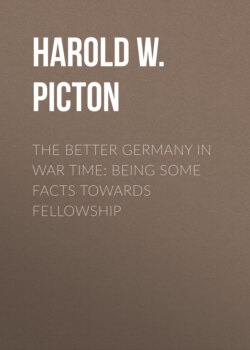Читать книгу The Better Germany in War Time: Being Some Facts Towards Fellowship - Harold W. Picton - Страница 7
На сайте Литреса книга снята с продажи.
Correspondence and Packages.
ОглавлениеTable of Contents
My next document illustrates the fact that each side makes similar complaints about the other. Telegram received by American Embassy, London, December 23, 1914, 22nd from Berlin Embassy:
“Foreign Office reports receiving many complaints that money and packages sent German military and civilian prisoners in enemy countries from Germany do not reach addresses. Please secure information for Department to forward German Foreign Office whether money and other postal matter will be delivered to such prisoners promptly and intact.—Bryan, Washington.”
There is no doubt that many letters and parcels have not reached German prisoners in England. Lord Robert Cecil has fully allowed this. (Times report. March 11, 1915.) In spite of this, I have no doubt that the British authorities have done their best to expedite delivery. I would suggest that this is probably the case on the other side, too. We shall indeed later come upon some definite statements in support of this view. One frequent cause of the non-arrival of parcels in Germany has been convincingly described by Mr. Ian Malcolm, M.P. (Daily Mail, November 8, 1916, and Reprint):
I did not approach this subject quite “new to the game.” I had already visited general post offices in England, Switzerland and elsewhere, and had seen thousands, literally thousands, of food parcels intended for our prisoners of war in Germany falling to bits and incapable of being forwarded for want of skilled packing. The sight was enough to make angels weep. To think that so much self-sacrifice had been exercised in humble homes to save up bits of dripping, crusts of bread, broken cigarettes, and what not, in order that these should reach son or brother or sweetheart in Germany, yet packed so badly albeit by loving hands, that in the first rough and tumble of the post the paper burst, the string came undone, and the contents of a dozen parcels fell in an inextricable jumble upon the floor.
There will unfortunately, too, be those in every land who will take opportunities for mean thefts. We have all had experience of that during this war, and the following cutting from the Daily News of October 5, 1915, may be given in illustration:
In a letter of thanks to the secretary of the committee of the Elswick and Scotswood workmen, formed for the purpose of sending comforts to the troops, Sir Ian Hamilton says:
I am extremely touched by the extraordinary generosity and kindness of the Elswick and Scotswood workmen. I will take great care to let our soldiers know to whom they are indebted for this most handsome contribution. Pray heaven the parcels will escape thieves and scoundrels who waylaid some of the gifts, and will arrive in good condition.
If there are, alas, not a few men who will steal from their comrades, there are not likely to be fewer who will steal from their enemies.
Speaking generally, however, the delivery of parcels on both sides soon became commendably regular. The care shown on the German side is warmly praised by Captain Gilbert Nobbs, who remained quite able to appreciate good deeds even after enduring terrible hardships and hearing worse stories from others. The bad deeds of war, soldiers are able to judge better than civilians. In his book “Englishman, Kamerad,” Captain Nobbs writes:
I was very much impressed with the fair and systematic handling of our parcels, letters and money; even letters and postcards which arrived for me after I had been sent back to England, were re-addressed and sent back. A remittance of five pounds which arrived for me after I had left was even returned to me in England, instead of being applied to the pressing need of the German War Loan.—(Daily News, January 25, 1918.)
An acquaintance of my own, a lecturer in a technical school, spoke to me to the same effect. He told me, as an illustration, of a parcel sent to him which had become quite shattered in transit (p.p. 7). The Germans transferred the contents to a sack, and, as he said, the temptation to pilfer the sorely-needed foodstuffs must have been great. My informant also spoke of the very thorough inoculation against disease.
